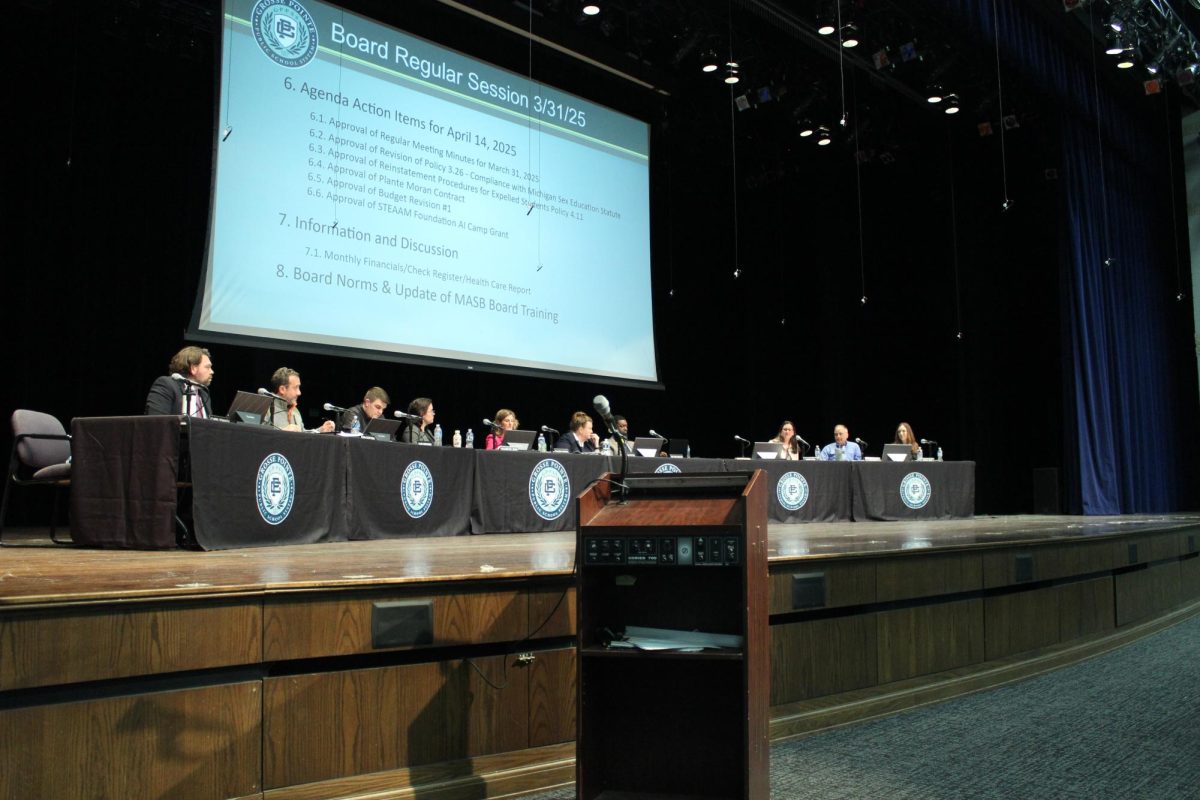By Lily Patterson ’16 and Claire Hubbell ’17 | Both Staff Writers
Proposed guidelines for schools regarding transgender students have created controversy in Michigan.
These guidelines recommend that schools call transgender students by the name of their choice and allow them to use the bathroom of whichever gender they identified with.
It was first outlined on February 23 in a memo to the State Board from the Michigan Department of Education, according to www.mlive.com.
According to www.mlive.com these guidelines are voluntary.
“School districts do have a lot of leeway in terms of what they do in their particular district,” government teacher, Mike Rennell, said. “I think the bill just opens up the way for school districts to apply it if they feel they want to.”
These guidelines have sparked a debate over whether students’ parents should have the final authority in the matter or if the students should dictate their own preferences.
“It would fall more to the parents than anyone because they are the ones who have custody of the child,” Rennell said. “If the parents are identifying the student as one gender, that is also what the school should be doing.”
However, genderfluid student, Noah Elam ‘18, said he thinks student should be the one to tell the school their preferences because while a student might be out to their peers, it is not always a guarantee that they’re out to their parents as well.
“If a parent doesn’t know, and they’re telling a teacher that you have to use this certain name, then that’s going to make their child feel awful, so I think that if your child knows how they want to be represented and identify, then they should be the one to tell people who they are,” Elam said.
Currently, Elam said public school teachers risk causing problems if they refer to a student by the name they wish to be called and the student’s parent is unaware.
“One thing that a teacher told me is that he could get in trouble if my mom didn’t know that he was calling me by a different name,” Elam said.
Elam said he knows a few teachers at South who are supportive in letting trans students choose what they want to be called.
Because there is no current legislation outlining trans students’ rights at school, Elam said he would recommend other trans students tell teachers their preferred pronouns and names if it is important to them.
“You should feel comfortable at school. But ask them not to use that certain pronoun or name around your parents if your parents don’t know because that could cause a lot of problems,” Elam said. “I think that for the most part, teachers at South would be pretty cool about it. I don’t think that they would want to purposely make someone feel uncomfortable.”
Gay Straight Alliance (GSA) club president, Shannon Horan ‘17, said that she thinks a student shouldn’t have to suffer more simply because their parent isn’t accepting of their identity.
While pronoun and name preferences are a large part of these guidelines, it also outlines the bathroom rights of the students, saying that it would give trans students the option to use whatever bathroom corresponds with the gender they identify with, according to www.freep.com.
Vice President of the Board of Education and this year’s Chairman of the School Board Policy Committee, Dan Roeske, said South currently does not have a specific policy when it comes to this issue.
“Anything we do have would be in compliance with current state law,” Roeske said.
The current policies of the Grosse Pointe Public School System include anti-harassment and nondiscrimination and access to equal educational opportunity policies that apply to transgender students, Roeske said.
Though Elam identifies as genderfluid and would prefer to use the male restrooms, he currently uses the female restroom. For him, it isn’t as bad as he would think, but he said it’s different for different people and how they identify.
“Some of my friends have been like, ‘I’ve gone into the girl’s bathroom and gotten some weird looks, but no one has been like ‘get out!’”, Horan said.
“I think there should be a separate bathroom for specifically trans students because it can be awkward and uncomfortable if they aren’t comfortable in that situation,” Elam said.
Elam said he once heard of a teacher permitting a student to use a specific, less popular bathroom as unisex, serving as a safehaven for one trans student. Establishing a gender neutral bathroom at South would help trans students avoid bullying from peers, he said.
Rennell also said a gender neutral bathroom could be beneficial for transgender and genderfluid students.
“Perhaps there could be some kind of midway place where we have a unisex bathroom that has privacy for all, so that they can use the facilities and still maintain their dignity,” he said.
While dialogue about trans students’ rights remains prominent in state governments, Elam wishes there could be more local discussion about the topic. Due to the lack of attention to trans students’ rights, he sometimes feels unrepresented and voiceless in the school community.
“I don’t think they have ever really addressed the issue,” Elam said. “I hope they do because people shouldn’t feel uncomfortable and scared to be themselves, especially at a place they have to go to every day.”
From Elam’s point of view, this bill is a step in the right direction but not a permanent solution to ignorance and judgement, especially in high school.
Rennell believes that these issues are of enough importance to reach the Supreme Court.
“Obviously there are some people that feel very strongly both ways. My guess is that it will probably end up as a court decision,” Rennell said. “If enough states do it, we will probably see percolation, and it will probably end up getting to the Supreme Court.”
In light of the recent Supreme Court ruling on same sex marriage, Rennell said people’s views on these issues are changing and similar issues will continue to arise in the Supreme Court.
Horan said that she also thinks representation on the matter has been changing for the better recently.
Elam views this as a positive, believing that it is an issue that needs to be talked about more openly.
“If it doesn’t directly affect your life in a negative way, and it could make a lot of people happy and comfortable, then I don’t see a problem with it,” Elam said. “I just think that we should talk about this stuff more, instead of trying to ignore the subject.”









































































